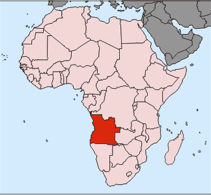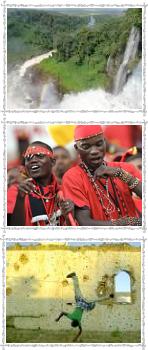 Angola is rebuilding its country after the end of a 27-year old civil war in 2002. The Angolan Civil War began in Angola after the end of the war for independence from Portugal in 1975. Formally brought to an end in 2002, an estimated 500,000 people were killed in the 27-year war. The civil war spawned a disastrous humanitarian crisis in Angola, internally displacing 4.28 million people, one-third of Angola’s population. The United Nations estimated in 2003 that 80 percent of Angolans lacked access to basic medical care, 60 percent lacked access to water, and 30 percent of Angolan children would die before the age of 5, with an overall life expectancy of less than 40 years of age.
Angola is rebuilding its country after the end of a 27-year old civil war in 2002. The Angolan Civil War began in Angola after the end of the war for independence from Portugal in 1975. Formally brought to an end in 2002, an estimated 500,000 people were killed in the 27-year war. The civil war spawned a disastrous humanitarian crisis in Angola, internally displacing 4.28 million people, one-third of Angola’s population. The United Nations estimated in 2003 that 80 percent of Angolans lacked access to basic medical care, 60 percent lacked access to water, and 30 percent of Angolan children would die before the age of 5, with an overall life expectancy of less than 40 years of age.
Three decades of Civil war in Angola has left behind a legacy of several enduring social problems. A huge exodus from the countryside to the Angolan Capitol, Luanda, has generated extreme poverty in the metropolis. The health and education system was basically destroyed and now there are far more orphans and abandoned children than the government can provide for.
Low-income families have inhabited the area in Viana, where OCSI is based, since 1996. All these families came from the outlying provinces of Angola during the war and settled in the suburbs of Luanda for protection from military activity. Some have managed to obtain small, low paying jobs in the city whilst others sell their wares at the market.
Many parents leave their houses at 4 am and return after 8 pm. Caring for the family is often left to the older sibling, even if he or she is still very young. This means no school and much responsibility to still very young children. There is little in the way of extended family support because most families were broken up during the war.
 Quick angola Facts
Quick angola Facts
Capital: Luanda
Official Language: Portuguese
Government: Presidential Republic
Population: 16,941,000
Area: 481,354 sq mi
GDP per capita: $4,961
Currency: Kawanza
Educational System
National Education Reform Regulation
Children and adults without proper documentation are restricted from registering into State schools
Who it affects?
Children over the age of six and adults who are behind in their studies
Our Solution
OCSI works to make sure that these children receive the documentation they need, taking them to national registrar’s offices and procuring birth certificates and ID cards
Find Out More About Angola
Article: Rich and Poor: One Country but Worlds Apart
Facts about Angola: World Facts Index


